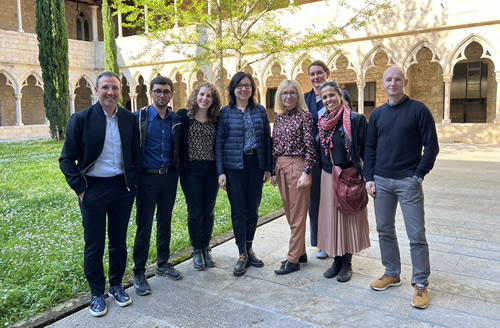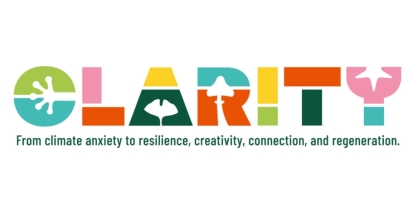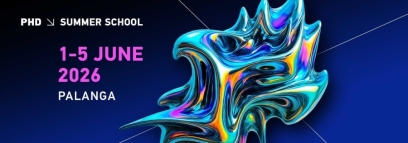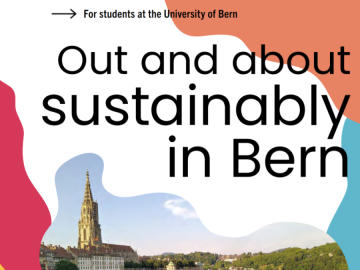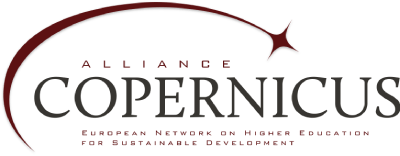The COPERNICUS Alliance is a partner in the recently started EU Erasmus+ project SDG-iLevel (Leveraging Individual SDG Contributions by University Staff). From 25-26 April the project partners from five countries met for the kick-off meeting in Girona, Spain. SDG-iLevel will create approaches, methods and tools aimed at uncovering, harnessing and strengthening the individual contributions of higher education employees to the Sustainable Development Goals in order to improve their mental well-being, job satisfaction, productivity and teamwork and to promote further SDG contributions.
The kick-off meeting was organized by the lead partner University of Girona. During two days, the participants discussed the project objectives and concretized tasks and activities. The CA was represented by Co-President Eglė Staniškienė and CA Network Manager Mario Diethart. In the project the CA will be responsible for communication and dissemination as well as for hosting a workshop for university staff members.
Project partners:
 The consortium of the SDG-iLevel project involves six partners from five countries with broad areas of expertise: Three universities (University of Girona, Spain; University of Rijeka, Croatia; Kaunas University of Technology, Lithuania), the COPERNICUS Alliance, as a network of higher education institutions, ACEEU (Accreditation Council for Entrepreneurial and Engaged Universities), an international quality assurance body, and Senior Europa/Kveloce I+D+i, an SME specialized in the development, implementation, and exploitation of R&D projects and their funding.
The consortium of the SDG-iLevel project involves six partners from five countries with broad areas of expertise: Three universities (University of Girona, Spain; University of Rijeka, Croatia; Kaunas University of Technology, Lithuania), the COPERNICUS Alliance, as a network of higher education institutions, ACEEU (Accreditation Council for Entrepreneurial and Engaged Universities), an international quality assurance body, and Senior Europa/Kveloce I+D+i, an SME specialized in the development, implementation, and exploitation of R&D projects and their funding.
About the project:
SDG-iLevel is a forward-looking project with a duration of 36 months that aims to drive innovation and achieve sustainable impact in three topical areas of higher education: (1) sustainable development, (2) digital innovation and (3) mental well-being of higher education staff.
The project will create approaches, methods and tools aimed at uncovering, harnessing and strengthening the individual contributions of higher education employees to the Sustainable Development Goals (SDGs) in order to improve their mental well-being, job satisfaction, productivity and teamwork and to promote further SDG contributions.
The need for the project stems from the lack of an existing comprehensive and easy-to-use framework for connecting the roles and functions of teachers, researchers, administrators and managers in Higher Education Institutions (HEIs) with specific SDG contributions. In recent years, sustainable development has become a prominent theme in higher education. However, HEI contributions to the SDGs are predominantly seen at the level of institutions, units, programmes, or projects. Individual contributions often go unnoticed and unappreciated. This prevents HEIs and staff from realizing their full potential to promote sustainable development and create improvements in higher education and society at large. SDG-iLevel closes this gap by unlocking this potential. In addition, recognizing and celebrating individual SDG contributions helps higher education staff to better understand and leverage their position in relation to the SDGs, increasing their commitment to sustainable development, enhancing mindfulness and a sense of purpose, improving mental well-being and overall job satisfaction, and fostering teamwork based on shared values and goals. While the primary focus of the project is on individual contributions to the SDGs, many of these contributions occur through collaborations involving groups, academic units, and entire organisations. This demands that individual SDG contributions should be analyzed as complementing and strengthening the collective effort to achieve the SDGs.
Objectives:
- Develop a conceptual framework for linking university roles and responsibilities to individual SDG contributions.
- Empower university staff with an improved understanding of their actual and potential roles and contributions to the SDGs.
- Equip university staff with effective online tools to discover, promote and strengthen their individual SDG contributions.
- Build and strengthen capacity at the university and departmental level to strategically promote individual SDG contributions.
- Facilitate the implementation of relevant policies in the departments of participating universities.
- Improve mental well-being, job satisfaction and productivity of university staff.
- Raise overall awareness of and commitment to sustainable development in higher education institutions.

